new posts in all blogs
Viewing: Blog Posts Tagged with: Proverbs, Most Recent at Top [Help]
Results 1 - 6 of 6
How to use this Page
You are viewing the most recent posts tagged with the words: Proverbs in the JacketFlap blog reader. What is a tag? Think of a tag as a keyword or category label. Tags can both help you find posts on JacketFlap.com as well as provide an easy way for you to "remember" and classify posts for later recall. Try adding a tag yourself by clicking "Add a tag" below a post's header. Scroll down through the list of Recent Posts in the left column and click on a post title that sounds interesting. You can view all posts from a specific blog by clicking the Blog name in the right column, or you can click a 'More Posts from this Blog' link in any individual post.
By:
Sue Morris,
on 6/11/2014
Blog:
Kid Lit Reviews
(
Login to Add to MyJacketFlap)
JacketFlap tags:
Laurent Richard,
Nicolas Ryser,
Children's Books,
Graphic Novel,
Middle Grade,
children's book reviews,
Books for Boys,
Graphic Universe,
proverbs,
martial arts,
Lerner Publishing Group,
4stars,
Library Donated Books,
Edward Gauvin,
graphic novel for kids,
Add a tag
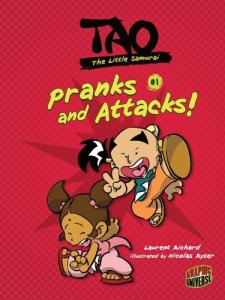 Tao, the Little Samurai #1: Pranks and Attacks!
Tao, the Little Samurai #1: Pranks and Attacks! 
by Laurent Richard & Nicolas Ryser, illustrator
translated by Edward Gauvin
Graphic Universe 1/14/2014
978-1-4677-2095-3
Age 7 to 11 64 pages
.
“Tao is studying martial arts at the famous Master Snow’s school. But no matter how hard he concentrates on his lessons, mischief gets in the way! Tai plays pranks and jokes around with his friends Ray, Lee, and Kat. He also struggles to get to school on time, learn new moves, and—most importantly—avoid doing his chores.”
Opening
“Ohboyohboy . . . this is gonna be tight. If I’m late, I’m gonna get chewed out! Hurry, hurry, hurry . . . home stretch . . .”
Review
Tao attends Master Snow’s martial arts school along with three friends, Ray, Lee, and his “not-girlfriend” Kat. Try as he might, Tao is late for school, and when there, has a hard time following Master Snow’s teachings. Each graphic novel page begins with a title, which is more like an oriental proverb. The second page is title “Showing off Can Spoil Dessert.” Tao is home and decides to practice annihilating blocks with a karate chop. He stacks three sets of two blocks to his right, left, and directly in front. Quickly, Tao chops with great force. “Bash! Bash! Bash!” Tao disintegrates every block, but his papa is unhappy with his son’s accomplishment—Tao used graham crackers as his cement blocks.
Kids, especially boys, will love Tao and his goofy ways. Tao tries but what he touches never goes right for him. I think reluctant readers will also like Tao. Rather than a 64-page story, there are 64 stories, one per page. Needing to stop is easy letting the reader–reluctant reader–go at their own pace, without becoming overwhelmed, or stressed. Remembering what happened is not necessary. If you don’t like the page where Tao is late for school, turn the page and a new situation will present itself. The stories have recurring characters that hang out with Tao, teach him, or guide him. So there is consistency in the Tai series.

The graphic novel is easy to following. The illustrations are bright and white lines mark each scene by placing them in boxes to divide the action. I found it was like reading a paragraph per block then moving on to the right for the next paragraph—only the blocks contained pictures not words. Some blocks do have a voice bubble with words, but those mostly set up or complete the joke on each page. Tao is completely for laughs and he succeeds. Needing help to put on his fencing outfit, not-my-girlfriend Kat helps and ties Tao up in bows—pretty pink bows—but Tao has no idea this is why his opponent is laughing.
A few pages I thought were especially good. Those included:
He Who Spies Gets a Black Eye
He Who Cannot Fly Must Avoid Falling
He Who Climbs Too Fast Falls Flat on His Face
The last involves Master Smith. Any page involving the Master is hilarious as he usually shows that age means nothing while performing some unusual human feat. After playing out all of the sage advice, the author takes readers “behind the scenes.” Here the author gives a short lesson on how Tao comes to life. The lesson includes writing voice bubbles, sketching characters and scenes, and colorizing the final images followed by black inking highlights so they stand out from the scene. The very last page lists the currently available editions of Tao. The color is light, almost like a transfer, which is what I thought it was. But, alas, it is not a transfer, so put those t-shirts away. Maybe next time.
Tao is a new graphic novel from Graphic Universe and rivals those published by Papercutz, the reigning king of graphic novels for kids. Tao is understandable and involves many situations most kids will face at some point in their life, karate not needed.
TAO THE LITTLE SAMURAI #1: PRANKS AND ATTACKS! Text copyright © 2011 by Laurent Richard. Illustrations copyright © 2011 by Nicolas Ryser. Translation copyright © 2014 by Edward Gauvin. Reproduced by permission of the publisher, Graphic Universe, Minneapolis, MN.
Buy Tao the Little Samurai #1: Pranks and Attacks at Amazon —B&N—Lerner Publishing—your local bookstore.
—B&N—Lerner Publishing—your local bookstore.
.
Learn more about the Tao the Little Samurai series HERE
Meet the author, Laurent Richard, at his website: http://www.laurent-richard.com/
Meet the illustrator, Nicolas Ryser, at his website:
Meet the translator, Edward Gauvin, at his website: http://www.edwardgauvin.com/
Find more graphic novels at Graphic Universe. blog: http://graphicuniverse.wordpress.com/
Graphic Universe is an imprint of Lerner Publishing Group
.
Also by Laurent Richard & Nicolas Ryser

Tao, the Little Samurai #2: Ninjas and Knock Outs!
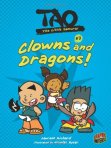
Tao, the Little Samurai #3: Clowns and Dragons!
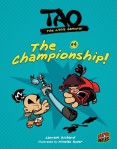
Tao, the Little Samurai #4: The Championship!

Tao, the Little Samurai #5: Wild Animals!
Also by Edward Gauvin
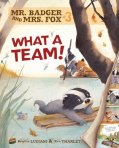
Mr. Badger and Mrs. Fox 3: What a Team!
Reviewed (#30) HERE.

Filed under:
4stars,
Books for Boys,
Children's Books,
Graphic Novel,
Library Donated Books,
Middle Grade Tagged:
children's book reviews,
Edward Gauvin,
graphic novel for kids,
Graphic Universe,
Laurent Richard,
Lerner Publishing Group,
martial arts,
Nicolas Ryser,
proverbs 







Without saying quite as much in the cartoon, the continuous snowfall is getting ridiculous! In a slight twist to this African proverb/oft quoted running inspiration, the gazelle and lion can be truly thankful that running from/after each other is their primary concern.
The actual proverb reads like this:
By: stephanie,
on 9/13/2010
Blog:
sruble.com
(
Login to Add to MyJacketFlap)
JacketFlap tags:
fun,
cats,
illustration friday,
art,
drawing,
if,
digital,
fun stuff,
geese,
ducks,
proverbs,
Add a tag
Check out the new sruble.com! My brand new website design is finally done! Yippee!!! (There is cause for cheering. I didn’t know if it would ever get done with all the glitches I had. Some duct tape and a few staples fixed it right up.)
The prompt for Illustration Friday this week was proverb. I couldn’t resist updating an old image to fit the proverb, “a rolling stone gathers no moss,” except my version is, “a rolling cat gathers no mice.” Poor kitty.

a rolling cat gathers no mice
The other proverb that came to mind was, “what’s good for the goose, is good for the gander,” which obviously means that when one goose has an umbrella, it’s good for everyone.

spring geese
I did this image a while back and for some reason, everyone thinks it’s a family of ducks. It’s not; they’re geese. You can tell by their pointy bills and the shape of their bodies, which admittedly are similar to ducks, but not the same, at least not the way I draw them. Besides, everyone knows that ducks don’t carry umbrellas. If you still don’t believe me, let me show you what my ducks look like. This is a duck that I drew around the same time as the geese:

duck
See, nice round bill, up to no good = duck.
I can tell you’re still not convinced. Okay, then. I’ll have to bring out another duck.

birthday duck
Ta Da! You can tell it’s a duck, because no self respecting goose would ever wear this hat! Also because of the rounded bill. You secretly want that hat, don’t you? Me either, but I do wish the duck would invite us to the party. You know they’re going to have cake. Yum, cake!
What was the subject of this post again? Oh yeah, proverbs. Remember, a rolling cat gathers no moss, and an umbrella that’s good for the goose is good for the gander. What’s your favorite proverb?
Don’t forget, I also have a shiny new website. Hooray! I think having a finished website calls for a celebration. Who wants to join me for some cake?

By: Kirsty,
on 11/25/2009
Blog:
OUPblog
(
Login to Add to MyJacketFlap)
JacketFlap tags:
Reference,
UK,
Business,
Current Events,
money,
A-Featured,
Dictionaries,
recession,
Power,
cash,
proverbs,
banks,
Add a tag

With yet more stories in the press about banks, bailouts, recession, and the economy, I wondered what the new edition of The Little Oxford Dictionary of Proverbs had to say about money. Unsurprisingly, it’s something that has preoccupied people for a very, very long time. Here’s a selection of money-related proverbs from across the centuries.
Cash is king.
Modern saying, summarizing the position in a recession.
Bad money drives out good.
Money of lower intrinsic value tends to circulate more freely than money of higher intrinsic and equal nominal value, though what is recognized as money of higher value being hoarded; English proverb, early 20th century; known as ‘Gresham’s law’ from Thomas Gresham (d. 1579), English financier and founder of the Royal Exchange.
The best things in life are free.
English proverb, early 20th century, originally from the title of a song (1927) by Buddy De Sylva and Lew Brown.
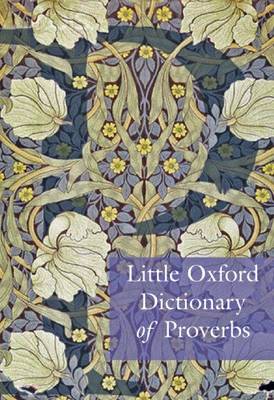 Get the money honestly if you can.
Get the money honestly if you can.
American proverb, early 19th century; the idea is found in the classical world, in the poetry of Horace (65–8 BC), ‘If possible honestly, if not, somehow, make money.’
He that cannot pay, let him pray.
If you have no material resources, prayer is your only resort; English proverb, early 17th century.
Money can’t buy happiness.
English proverb, mid 19th century.
Money has no smell.
English proverb, early 20th century in this form, but originally deriving from a comment made by the Roman Emperor Vespasian (AD 9–79), in response to an objection to a tax on public lavatories; compare Where there’s muck there’s brass below.
Money is like sea water. The more you drink, the thirstier you become.
Possession of wealth creates an addiction to money; modern saying.
Money isn’t everything.
Often said in consolation or resignation; English proverb, early 20th century.
Money is power.
English proverb, mid 18th century.
Money is the root of all evil.
English proverb, mid 15th century, deriving from the Bible (I Timothy 6:10), ‘The love of money is the root of all evil’.
Money, like manure, does no good till it is spread.
English proverb, early 19th century; the idea is found earlier in the Essays of Francis Bacon (1561–1626), ‘Money is like muck, not good except it be spread.’
Money makes the mare to go.
Referring to money as a source of power; English proverb, late 15th century.
Money talks.
Money has influence; English proverb, mid 17th century.
A penny for the guy.
Traditional saying, used by children displaying a guy to ask for money towards celebrating Bonfire Night; a guy is an effigy representing Guy Fawkes, a leading conspirator in the Gunpowder Plot to blow up James I and his Parliament in 1605, which is traditionally burned on 5 November, the anniversary of the discovery of the plot.

By: jeff,
on 8/1/2009
Blog:
The MJM Books Blog: Featuring all kinds of info you never knew you needed!
(
Login to Add to MyJacketFlap)
JacketFlap tags:
Children's Books,
writing tips,
writing advice,
writing,
Lessons,
advice,
Psalms,
Morals,
Proverbs,
how to write children's books,
For Authors,
For Artists,
Aesop's Fables,
Add a tag

Above is a sample picture from my wife’s keepsake children’s book collection. They are from a series called “Alice in Bibleland” which aims to educate young children about God and good behavior. We’ll come back to them in a moment.
Some children’s books, The Berenstien Bears being the biggest culprit in my mind, aim to teach a moral or lesson through their stories. Little Timmy learns to tell the truth, Silly Sarah remembers to brush her teeth and so on.
Too often, these stories are corny or, worse yet, “preachy” and kids can see right through them. Given free choice, how many kids say, “Read me ‘Tommy Turtle Learns to Respect His Parents’!” Not many. What is it that so often makes these stories fall flat? I believe that it is because these stories are not “true”.
Even in fiction, we want our stories to have a ring of truth to them even as we acknowledge that they may have never happened at all. We want stories that we believe could happen, or, given a universe where bears and rabbits talk and play poker, would likely happen in a similar fashion.
This is called the suspension of disbelief, but it doesn’t mean believing anything and everything in a story. It means allowing for the possibility and “playing along”. Let’s pretend I’m reading a story (suspend your disbelief for a moment) whose setting is in a world exactly like ours except that bears and rabbits talk and play poker. Now let’s say that the bears discover that the rabbits have been cheating and say, “Gee Whiz, Rabbits. Your cheating has cost us our entire month’s salary of honey. We would kindly like it back.” “No way, Jose,” say the Rabbits, to which the Bears reply, “Oh well, forgive and forget. Another hand?”
This story is unbelievable. Not because the bears and rabbits are talking and wagering large sums of honey, but because we don’t believe that, GIVEN all those facts, the bears would react in that manner. The same goes with a lame story about Little Johnny stealing from the cookie jar. He does so because he wants a cookie, and feels good when he succeeds in getting it. But when his mother tells him, “You shouldn’t steal from the cookie jar, it will spoil your dinner,” he wouldn’t believable say, “You are right, Mother. What a naughty boy I’ve been. I will listen to you from now on.”
We might believe if, however, Little Johnny continues to eat all the cookies, gets an upset stomach and misses out on his favorite meal, Pizza Night! Nothing sets of alarm bells in our brains more than a character who is forced to act counter to her nature by an author with an agenda.
Now, back to Alice in Bibleland. The book that particularly appealed to me was called “Psalms and Proverbs”. As moral instructions, Proverbs are very good because they represent wisdom and truisms passed down for hundreds of generations. The same goes for Aesops Fables (a good site full of these fables can be found here). Everyone knows someone like the greedy fox, or the shortsighted grasshopper and the lessons they teach from their follies ring true because we’ve observed people or situations like them for ourselves.

Whether or not you are aiming to teach your child about God, the above pages are universal. “A soft answer turneth away wrath,” and “Pleasant words are as a honeycomb, sweet to the soul, and health to the bones.” They are moralistic and illustrated in AGONIZING sweetness, but they don’t read as “false”, like some other books that strongarm their stories to fit the moral or lesson.
I hope I’ve helped you put your finger on why some of those books you’ve come across (you know the ones) are so dang CORNY.
…


By: Justin,
on 9/30/2008
Blog:
OUPblog
(
Login to Add to MyJacketFlap)
JacketFlap tags:
blogging,
Poetry,
Literature,
Reference,
Blogs,
language,
quotations,
A-Featured,
proverbs,
Add a tag
By Justin Hargett, Associate Publicist
In his most recent book about language, As They Say in Zanzibar: Proverbial Wisdom from Around the World, David Crystal has collected and sorted some of the world’s most interesting proverbs and sorted them by theme and topic. After looking through the book, I’ve taken an extra step and found many that could easily be applied to the art of blogging (maybe with a little technological updating, in some cases). Here’s a sampling of precious world wisdom for  both readers and writers alike as they surf the blogosphere:
both readers and writers alike as they surf the blogosphere:
• After three days without reading, talk becomes flavourless - China
• Think much, say little, write less - France
• Good scribes are not those who write well, but who erase well - Russia
• Never argue with someone who buys ink by the barrel - China
• Where hands are needed words and letters are useless - Germany
• What one writes remains - Netherlands
• Wise silence has never been written down - Italy
Here are some more proverbs about reading and literature in general. To listen to David Crystal discuss some of his own favorites, listen to this podcast from WBUR’s On Point. Feel free to add your own favorite proverbs (for blogging, or just for living) below in the comments section.
• Other people’s books are difficult to read - Netherlands
• There is no worse robber than a bad book - Italy
• If you want to be acquainted with the past and the present, you must read five cartloads of books - China
• To read a book for the first time is to make the acquaintance of a new friend; to read it a second time is to meet an old one - China
• Life without literature is death - Latin
• It is not good to be the poet of a village - Germany
• There dies a poet in everyone - England
• Poets are fathers of lies - Latin
• Poets and pigs are appreciated only after their death - Italy
• Slowly but surely the excrement of foreign poets will come to your village - Mali
• The dog may be wonderful prose, but only the cat is poetry - France
ShareThis
 Tao, the Little Samurai #1: Pranks and Attacks!
Tao, the Little Samurai #1: Pranks and Attacks! 
—B&N—Lerner Publishing—your local bookstore.















 Get the money honestly if you can.
Get the money honestly if you can.


The shiny new website looks great. I especially liked hearing about the Kitty-Sheila connection and your portfolio is beautiful. The summer ghosts made me smile.
Ooh! The new site looks fabulous. I’m running Firefox on Windows and I went through each page and didn’t encounter and glitches or anything. Duct tape and staplers totally come in handy. I love it!
I love it!
And hah, I heart the rolling kitty. Poor kitty–but lucky mice!!
C.K. – Thank you! The Kitty-Sheila connection was a huge surprise when I figured it out, but now it makes perfect sense. I even gave Sheila a kitty to honor the connection.
Courtney – Thanks! I’m so glad that you didn’t find any glitches. It was really great of you to look for them though. Yes, poor rolling kitty! But as you know, sometimes you have to be mean to your characters. heh.
Ha , you crack me up, love the goose with the umbrella and how geese have hat snobbery.
Melissa – happy that the goose with the umbrella and the hat snobbery by the geese cracked you up. Thanks for stopping by!